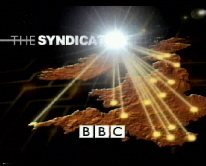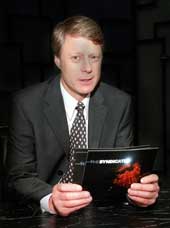The Syndicate
Contents |
Host
Nick Ross
Broadcast
Bazal for BBC One, 26 June to 15 September 2000 (15 episodes in 1 series)
Synopsis
A jazzy set, tough questions posed to Britain's quiz teams all presented by a former newsreader. Yes, it's Masterteam!
Sorry, no it's not. 15 years have since passed and it's The Syndicate. For Angela Rippon, in this case read Nick Ross, one of the few Rosses in the country that isn't related to Jonathan Ross.
Two teams of four people compete in a knock-out competition to prove that "they're it" at quizzing by becoming the top syndicate in the country. It's a rounds-by-numbers affair, but hang on to your hats because it's actually quite good.
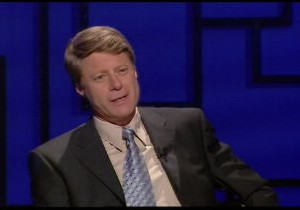 Host, Nick Ross
Host, Nick RossIn the first round, a subject is read out and the team captain has to nominate one person in the team to answer based on that subject. If a wrong answer is given, that player is eliminated from the team. The exception to this is the captain, who can never be eliminated at any point throughout the show. If the captain nominates themselves for the question and are foolhardy enough to get in wrong, they have to nominate a member of the team to sacrifice.
One other point to note here is that only the captain gets to wear what he/she likes on the show - the other three all wear black - no doubt because they're always at risk of being faded out into darkness.
On the other hand, if they get the question right they can either reclaim one of their fallen team mates or they can add 10 points to their score. This is where the tactics lie - on the one hand, no-one likes losing team members as it reduces the flexibility available in terms of specialist knowledge. On the other hand, if you never claim the points you'll never get anywhere. A very Germanic gaming mechanic, and a nice one at that - also some shades of The Crystal Maze.
Round 2 is where it gets nasty. One hour before recording, a specialist subject was nominated by each team. However, it's the other team that have to answer questions on it! Very sneaky. During the hour the teams have access to a library, telephone and Internet access to learn as much as they can.
When it comes to this round, the team are asked questions of a level of difficulty that are hard if you've only had an hour but should be reasonably easy for the expert. If the team get the question right, they get 10 points (or reinstate a person). If they get it wrong and the opposition are able to answer the question - they should, given it's their specialist subject - they can knock one of the opposition out.
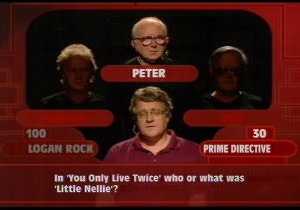 The red team try to deal with questions on Bond movies
The red team try to deal with questions on Bond moviesIn an attempt to insert some artificial gravitas, when explaining the rules Nick Ross asks the team captains to say "I understand" before proceeding with the questions for the next round. It's very gimmicky, and frankly it's a bit silly. Of course they understand how the rules work, so why ask?
Round 3 is a bit like round 1 except it's a series of general knowledge questions open to all the active members of the team, with "winner stays on" until the team fluffs a question and the other team gets control. Correct answers earn 10 points, or the right to eliminate an opponent, or the ability to reinstate one of your team.
A clever twist comes in 3 minutes from the end of the show. The teams are frozen from then until the competition is over. However, until that point, the teams can either sell active players for a bonus 30 points, or buy back eliminated players for minus 30 points.
What's interesting about the mechanics is that they do provide a good swings-and-roundabouts feel to the game. Not only is success measurable in terms of points won, but it's also determined by the number of players active in the game. Normally that would be confusing, but here it somehow seems to work.
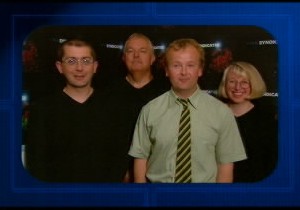 After the show, the team do a debriefing session while the credits roll
After the show, the team do a debriefing session while the credits rollIn addition, it doesn't require a run of that many questions for the fortunes to be completely reversed - answering six questions in a row can completely reinstate your team and completely obliterate your opponents (bar the captain).
The set is nice but isn't brilliant - it's a little cramped, some bits look like flimsy plastic, and it's strangely oriented with the audience stuck out in the middle of nowhere. But there are some nice touches, including the very nifty animated "tracer" lights that wiggle their way through the backdrops.
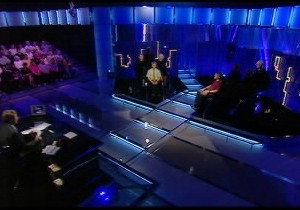 The set - notice the tracer lights in the background
The set - notice the tracer lights in the backgroundNick Ross is a safe pair of hands for this show. He's a little inconsistent in his pacing, but always self-assured and - most importantly - good at pronouncing the questions. The music and computer graphics also have some nice touches, although a few of the elements don't seem to gel as well as they could.
The question writing is well up to par, however - the questions are on familiar general knowledge territory but they're usually phrased in a different style to what you're used to on your average quiz show. Think University Challenge lite.
Overall, not a bad effort. It was nice to see quizzes back on BBC1 primetime, shame it only lasted a series. Also, it was the first quiz to ever feature post-show analysis from the contestants.
Champion
The series winners were The Cohorts from Liverpool, who beat The Magpies from Newcastle by 10 points.
Catchphrases
"Understand?"
Theme music
Philip Pope
Web links
Andy Walmsley's set design pictures - There are some pictures on the site that features future Chaser Mark Labbett as a contestant
Videos
The very first episode.

